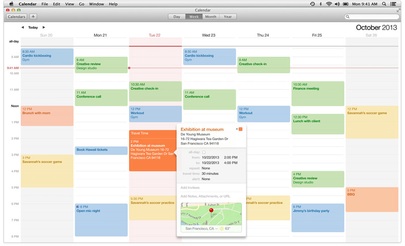For most High Schoolers, Mom is their calendar. She keeps track of classes, school trips, holidays, doctor visits, swimming club, etc.
Then students go to college, and chaos ensues as Mom steps back. Students start forgetting classes, missing meetings, double-booking swimming and volleyball, running late for just about everything, and just being in a constant tizzy.
The answer is not the back of your hand or blizzards of post-it notes. The answer is a calendar, ideally a digital one.

There are multiple calendar apps and services out there, but the two standouts are Google calendar or Apple’s iCal for Mac users. Whatever you choose, make sure your calendar has the following features:
1. Cross-platform syncing. You need your calendar to sync across multiple devices so that you can enter events and access your calendar wherever you are and whatever device you’re working on - cellphone, Tablet, PC or laptop.
2. Notifications. When you enter an event you should usually set up a notification as well, so that the calendar will send you an email, a beep, or a buzz a specified number of minutes beforehand.
3. Year, Month, Week, and Day Views. Sometimes you need to drill down to a specific day to see what you are doing at 12 noon. Other times you need to see the week on one page to identify areas of over-scheduling or perhaps areas where you can schedule study time.
4. Color coding. You may want to assign color coding for different kinds of events – classes, sport, church, etc. You definitely want to color code study time so that you can see at a glance if you are allocating enough hours to assignments and exam prep.
5. Start and finish times. You need the facility to enter start and finish times so that it blocks off a visible portion of your calendar and you don’t schedule anything to begin before the previous event ends.
6. Location. Classes take place in different buildings. Games and competitions vary their venues. You want a calendar that lets you enter where as well as when.
7. Sharing. This is not a must-have, but eventually (we hope) you will have a significant other in your life and you’ll want (I hope) him or her to know where you are and when you are available. It’s therefore helpful to have the ability to share calendars. And if you’ve got nothing to hide (!) why not make it available to your parents too, so that they can schedule family events and trips with you.
Let me finish up with a few extra tips.
1. Enter the event as soon as you can. Don’t wait until later and hope you’ll remember to enter it and get all the details right. Just get into the habit of entering the data immediately.
2. Schedule everything. It’s tempting to just schedule classes and other events that you must attend. However, unless you schedule some of the more optional events – they probably won’t happen. For example, you should schedule blocks in your calendar for studying, for exercise, for friends.
3. Schedule margin. Don’t schedule events so close that you are always rushing from one thing to another. Estimate how long it will take you and then add some margin to allow for traffic, unplanned conversations, etc.
4. Use small blocks. The best studying gets done in large uninterrupted blocks of time. So, where you see these possibilities in your calendar, mark them down. Then you’ll see other bits and pieces – 30 minutes here, 40 minutes there – what should you do with them? These are valuable but easily wasted time slots. Without undermining what I said about allowing for margin, you may want to use some of these 20-30 minute blocks for the multiple small to-dos of each day like email, phone calls, errands, etc. Don’t shorten, interrupt, and waste substantial study time blocks with these little things.
5. Check your calendar. No point in going to all the bother of entering all that data and then not checking it. Don’t just rely on the beep or the buzz a few minutes beforehand. Every Saturday evening or Monday morning you should look at the week ahead and make sure you have a good sense of what’s planned. Then every evening, check for the next day’s events and plan accordingly.
6. Accountability. It’s a good idea to ask someone to look at your calendar from time to time to see if you are using time well. Ask someone who is well-organized and self-disciplined to take a look and offer advice.
Other Resources
New Student Tip #2: Wunderlist
Thriving at College by Alex Chediak (for students)
Preparing Your Teens For College by Alex Chediak (for parents of students)